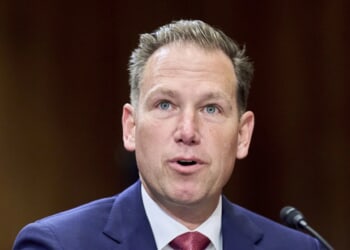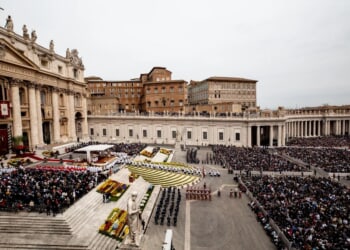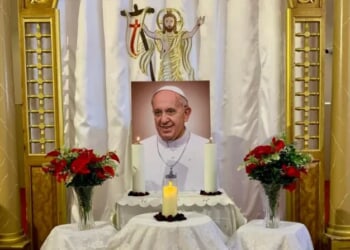The Catholic Church has suffered the passing of another Pontiff. Early on Easter Monday, Pope Francis passed away at the age of 88, according to Vatican authorities. The Pope was hospitalized on Feb. 14, over concerns about worsening bronchitis, and was later diagnosed with double pneumonia. He spent 38 days in the hospital and was discharged on March 23. Shortly before he died, Pope Francis met with U.S. Vice President JD Vance in Rome, and blessed crowds gathered at the Vatican for Easter.
The date of Pope Francis’s requiem Mass has yet to be announced, but the Mass will be followed by nine days of mourning, each featuring the celebration of a memorial Mass. Instead of being interred in St. Peter’s Basilica, the final resting place of 91 Popes, including Popes St. John Paul II and Benedict XVI, Pope Francis has requested to be buried in the Papal Basilica of St. Mary Major, the burial place of Popes Honorius III, Clement VIII, Clement IX, Sixtus V, and St. Pius V.
While the late pontiff did much to promote the Catholic understanding of mercy and laid a particular emphasis on the “pastoral” role of the Pope, the Holy Father’s legacy, unfortunately, will be one of ambiguity and confusion. Over the course of his nearly-12-year-long pontificate, Pope Francis promoted numerous progressive prelates, initiated stringent restrictions on the celebration of the Tridentine Mass, surrounded himself with problematic allies and advisors, and, notably, oversaw the explosive revelation of the crimes of disgraced former cardinal Theodore McCarrick. (RELATED: RIP Theodore McCarrick)
At the outset of his papacy, Pope Francis raised concerns when he eschewed some of the more traditional trappings and customs of a newly elected pope. For example, he chose to greet the College of Cardinals not seated upon the papal throne but standing. He also opted not to wear the traditional red, ermine-trimmed mozzetta during his first appearance as pope on the balcony of St. Peter’s Basilica, but a simple white cassock instead. Those decisions seemingly set the tone for the remainder of the Francis pontificate.
Pope Francis saw himself as a reformer, and there is no doubt that many of the “reforms” he initiated originated in a heart inspired by mercy and charity. It is possible that the pontiff’s history as a Jesuit influenced how he chose to execute the “reforms” he devised. The Jesuits were founded as a missionary order, and their zeal in that endeavor led them to the remote and far-flung fringes of the world. The order has, unfortunately, become increasingly progressive in recent years, perhaps because its missionaries have spent so long at the fringes of society that they have forgotten to return to the fold with the lost sheep that they sought in the first place.
The late pontiff’s “reforms,” however, have mired the Catholic Church in controversy and ambiguity. Age-old moral teachings promulgated, clarified, and defended by the Apostles, Doctors of the Church, and Saints throughout the centuries have not been directly contradicted, per se, but subtly undermined, with greater emphasis being laid on a pastoral sense of understanding, accompaniment, and non-judgementalism than on the mortal peril in which the sins of the modern age place countless souls.
There is much with which the next pope will have to contend, including financial corruption in the Vatican Bank, increasingly ideologically and politically vocal priests and prelates, impending schism in nations like Germany, and the infiltration of progressive, modernist theology into seminaries and pulpits around the globe, but the overarching task of the next pontiff will be to dismantle the morally ambiguous “pastoral” spirit fostered under Pope Francis. The world is not in need of more misguided “understanding” and “accompaniment,” but of firm and clear teachings on complex and pervasive moral issues, which far too many today are content to either ignore or else tacitly approve.
Catholics everywhere should pray for the upcoming papal conclave and for the next pope, that God may grant him courage and wisdom in the defense of the Holy Catholic Church. Catholics also must remember to pray for the soul of Pope Francis. Yes, his pontificate has been a penance for many of us, and we have watched in pain and anguish as the Church, which we call home, has become embroiled in bitter ideological, theological, and even liturgical arguments, disputes, and conflicts. Many of us have felt ignored, neglected, ostracized, and even punished, at times, for adhering to the teachings, customs, and practices the Church has held to be sacred for centuries. Yet this is all the more reason to pray for Pope Francis and his soul.
Whatever one’s thoughts on him, Pope Francis was our Holy Father, and we owe him our filial love and respect. But bear in mind also that for nearly 12 years, he has carried the weight of the entire Catholic Church — and all the souls therein — upon his shoulders. Her will be judged not only on how he lived his life, on whether or not he engaged in gossip or lust, on his private thoughts and musings as the rest of us are and will be, but on how he tended to the flock God entrusted to his care. This is a heavy burden, and no ambiguity will serve in the late pontiff’s defense. We must, therefore, pray for the repose of his soul, that we might someday enjoy the Beatific Vision alongside our Holy Father, in an eternity where all the hurts and divisions dealt and sown over the years are healed and made whole in Christ.
READ MORE from S.A. McCarthy:
Tolkien’s Eucatastrophe and Easter


![NYC Tourist Helicopter Falls into Hudson River, Siemens Executive and Family Among Those Killed [WATCH]](https://www.right2024.com/wp-content/uploads/2025/04/NYC-Tourist-Helicopter-Falls-into-Hudson-River-Siemens-Executive-and-350x250.jpg)






![Green Day’s Cringe Trump Diss Ends in Fire and Evacuation [WATCH]](https://www.right2024.com/wp-content/uploads/2025/04/Green-Days-Cringe-Trump-Diss-Ends-in-Fire-and-Evacuation-350x250.jpg)
![Red Sox Fan Makes the ‘Catch of the Day’ with Unconventional ‘Glove’ [WATCH]](https://www.right2024.com/wp-content/uploads/2025/04/Red-Sox-Fan-Makes-the-‘Catch-of-the-Day-with-350x250.jpg)






